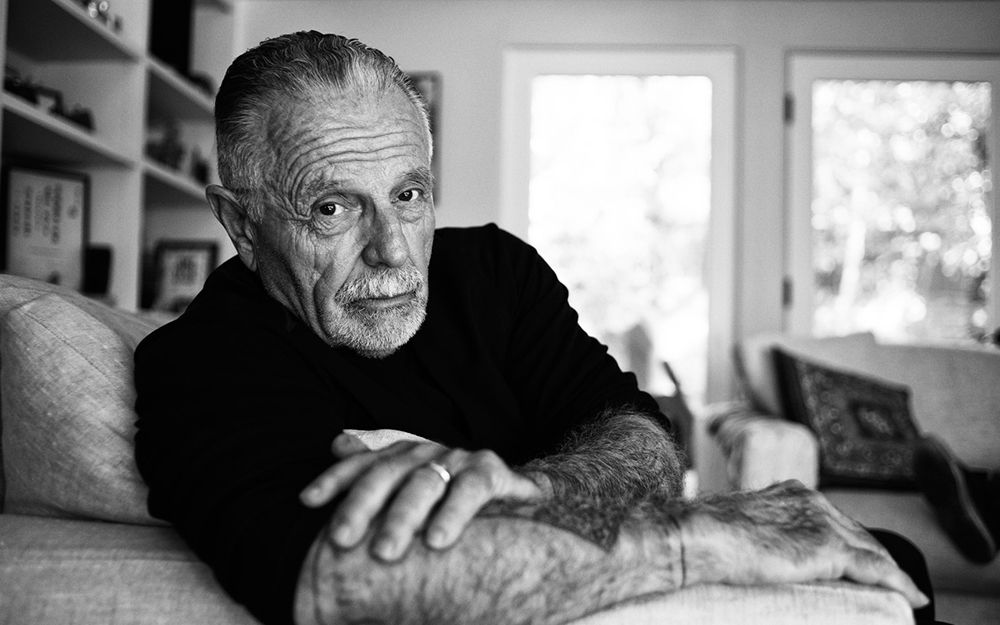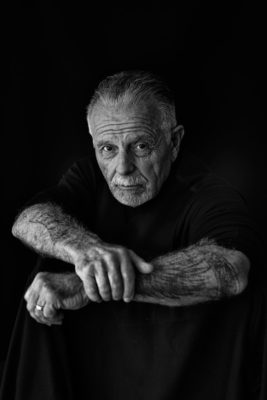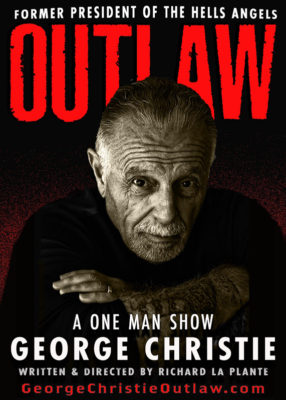
BY TRACY DIETLIN
For more than three decades, George Christie was among the most prominent leaders of the Hells Angels biker organization. He was prosecuted and persecuted; hunted and hated, but always respected, even by his enemies, of which there were many.
Now, Christie shares his journey from accused (though not convicted) murderer and arsonist to legitimate business owner and family man in the new, solo stage production “Outlaw.” Written and directed by Richard La Plante, “Outlaw” is coming to the Arthur Newman Theatre at the Joslyn Center in Palm Desert for one performance only, on Saturday, May 19.
Based on his memoir “Exile on Front Street: My Life as a Hells Angel and Beyond,” the show explores how the son of poor Greek immigrants became one of the most influential leaders of the world’s most infamous motorcycle club.
“This show has taken me deeper into realizing why I became who I am,” Christie said. “I am not making excuses, nor am I condemning my old lifestyle. It’s helping me find peace with myself. I don’t think you can grow if you don’t explore the good with the bad.”
During his years with the Hells Angels, Christie survived gang wars, multiple prosecutions and attempts on his life. In 1979, he was among a group of Hells Angels members targeted by then-U.S. Attorney Robert Mueller, who is now spearheading the investigation into alleged Russian influences on the 2016 presidential election. Through it all, Christie considered himself a peacemaker, by the standards of outlaw biker clubs.
“The crime rate in Ventura was lower when I ran the Hells Angels,” he said. “We didn’t allow drive-by shootings. I told our members they could deal with problems, but not in ways that endangered the community. I kept innocent people from getting hurt.”
Christie left the Hells Angels in 2011 and began writing, speaking, promoting concerts and consulting for defense attorneys. In 2015, The History Channel produced a documentary series about him, titled “Outlaw Chronicles: Hells Angels.” While the documentary focused on the Hells Angels, playwright and co-producer Richard La Plante said the new stage production will offer a more personal portrait of Christie.
“I find George’s story compelling because I believe if he was not an outlaw and had not chosen that path in life, he could have been the president of a large corporation or a state senator,” La Plante said. “He has the brains and charisma to do anything and be anyone. It was those brains and charisma that took him to the top of the outlaw biker world. It was his choice, guided by circumstance, and one that he has never regretted or whined about.”
“Outlaw” will be performed at the Arthur Newman Theatre at the Joslyn Center, 73750 Catalina Way, Palm Desert, CA 92260, on Saturday, May 19, at 7:30 p.m. Tickets are $30 and can be ordered by calling 213-7139149 or online at www.georgechristieoutlaw.com.
“Outlaw” is produced by DTLA Entertainment Group. Information about the show is available at www.GeorgeChristieOutlaw.com. Information about George Christie is available at www.GeorgeChristie.com.
George Christie took time recently to do a phone interview with Publisher Tracy Dietlin.
CVW: How did the TV show The Outlaw Chronicles come about?
George Christie: “I was in prison when the History Channel reached out to me. My daughter is a criminal lawyer. I never called home much this last stint but I emailed a lot. And she told me ‘Dad I think these guys are serious.’ The next thing I know I’m back home filming that show.”
CVW: So myth has it that it’s just not that easy to walk away from the Hells Angels or any outlaw motorcycle club. How were you able to do that and why did you decide to?

GC: “I started having these thoughts as a leader and a vision and I believe that if you’re a leader and you don’t have a vision then you’re not much of a leader. I had this vision of uniting all the bike clubs, not as all one club, but that people with like minds would be able to get on the same page and put our differences aside and share the highway, if you will, philosophically speaking. I was making progress and then the club and the whole culture seemed to go through a transition. I was losing footing. We had moratoriums with the clubs we were having issues with and things started to flare up and before I knew it we have 5 conflicts going on. I went and had a heart to heart with the club and said that this wasn’t the vision I had for the club and that I thought we were doing ourselves a disservice as a club as well as the culture. It took me a couple years to make up my mind and I walked into the meeting and I resigned. And shortly after that the club changed my status, and usually when you leave they have different statuses, first of all they really don’t like you leaving, but I felt like I had given them 40 years being loyal and true and I thought it would be something they would accept. A couple weeks later they called me and said they had reconsidered my status and that they were going to ban any Hells Angels in good standing from talking to me or having any association with me and from there it snowballed and people started saying I was a coward and a quitter and an informant.
Shortly after that I got indicted by the Feds and they wanted me to make a deal with them, which I wouldn’t so I ended up going to prison in Texas. I was on house arrest for 2 years and then they sent me to Texas for a year. So my departure from the club was nothing what I envisioned. I mean I planned on stepping away and relaxing. No plans on writing the book or doing the TV show and certainly no plans on going to prison. Only in America do you go to prison and come home to a TV show.”
CVW: So do you have any contact with your brothers at all now?
GC: “They’re not allowed to talk to me and I had a clause in my plea bargain where everyone across the board agreed that I wasn’t able to wear any kind of colors, or correspond in any way with anyone from the club. So not only did the Hells Angels put me on restriction but the government did too.
CVW: You said it felt like a divorce.
GC: “You interact with somebody for 40 years, whether consciously or subconsciously you become co-dependent. A lot of guys in the club come from broken homes and I feel like when I left there may have been some abandonment issues. It got really bitter.”
CVW: How did they react to you doing the TV show?
GC: “There are members that have left the club and those that are still in the club that have done interviews and TV shows so I don’t think I’m breaching protocol any more than anyone else. I’m independent now and I feel if people are going to try to say things about me or rewrite history I feel I have the right to tell it the way I saw it.”
CVW: Have you ever regretted your decision to walk away?
 GC: “I have no regrets. It was time for me to move on. The vision I had worked so hard for got lost. We’d gotten so bureaucratic that we’d gotten away from our original mission. We’d become the people we rebelled against. I was speaking from my heart to my brothers and was thinking that maybe someone who had devoted that much time and heart, that they could see that I was disillusioned. I could’ve stayed in the club and kept my mouth shut but that wouldn’t have been in the true vain of being an outlaw. I got to the point that I felt I had too many restrictions and I wanted my freedom.
GC: “I have no regrets. It was time for me to move on. The vision I had worked so hard for got lost. We’d gotten so bureaucratic that we’d gotten away from our original mission. We’d become the people we rebelled against. I was speaking from my heart to my brothers and was thinking that maybe someone who had devoted that much time and heart, that they could see that I was disillusioned. I could’ve stayed in the club and kept my mouth shut but that wouldn’t have been in the true vain of being an outlaw. I got to the point that I felt I had too many restrictions and I wanted my freedom.
“When I walked into this culture in 1966 it was a very Live and Let Live society. If you had a transgression with another club the loser probably bought breakfast. You didn’t go home and get a gun and hunt the guy down and kill him.
In the early days it was all about riding motorcycles and building motorcycles. You couldn’t walk in to a Harley shop and just buy a custom bike you had to build your bike. And if you didn’t have the ability to do that you weren’t accepted. My first bike was a 57 pan head. I took it apart and built it again. It was about riding and brotherhood. Each area had a particular style of bike back then. If someone pulled up next to you on a bike and they were from San Francisco you knew that was where they were from by their bike; the pegs, the tank, the position of the bars. Now people walk in to a Harley shop and spend $20,000 on a custom bike and no nothing about it.”
CVW: What type of bike are you riding now?
GC: “I’m riding an Ultra Classic Harley all blacked out.”
CVW: What do you feel is the biggest misconception about the Hells Angels?
GC: “Law enforcement had painted a bad picture of all outlaw bike clubs, the 1% type bike clubs, as criminals. Outlaw bike clubs are not criminal organizations, but the clubs do attract a lot of people with criminal backgrounds. But I could say the same thing about politicians, doctors, but being an outlaw club member brings you a lot of weight and if you misuse that weight and use it to only benefit yourself it can impact the bike club in a negative way. I think they should start being more careful about who they let in and what the procedures are to get in the club. It all started changing back in 1979 in LA where I was and we were in the midst of a bike war with The Mongols. It had just flared up and everything seemed to spin out of control from there. There are some members who join for their own agenda and not for the brotherhood or to ride motorcycles.”
CVW: Have you ever watched the TV show Sons of Anarchy?
GC: “I never have watched it. I want to. I’ve talked to a lot of outlaw bike people who love the show, traditional mainstream people who love it, police officers who love it. I think Kurt Sutter tapped into the mystic of it. Bravo to him. His show impacted the whole culture on many different levels.
Back when we were selecting a jury for my trial my oldest daughter was my attorney. You can impose questions on the potential jury and I came up with this idea and I asked them ‘Have you ever watched SOA?’ And did they believe that bike clubs are all under a criminal element. And the judges loved it. Just about everybody raised their hand saying they watched it and raised their hand that they thought there was a criminal fringe to all bike clubs and that the President had knowledge of everything going on with every member. The judge was dismissing jurors left and right because they believed that was all true from watching this show. Judge Woo looked at the jury and said ‘You have to keep in mind that this is a TV show for dramatic purposes and it’s not reality.’ We had a rough time and we dismissed so many jurors and that’s when the DA got so frustrated because he knew that we could possibly have a good case for a mistrial or retrial because of the way it was impacting the case, so they made that plea deal with me. So I think that indirectly Kurt Sutter helped me get this marvelous plea deal because his show impacted them so much and they were so enamored by his show they couldn’t get past that. So hats off to you Kurt Sutter!”
CVW: (Christie vows that he’s going to watch SOA.)
GC: “I’m making a commitment to you Tracy that I’m going to binge watch that show very soon. Just when I think I’m going to take some time off to relax, I start writing another book or start another project.”
CVW: What moment are you the most proud of?
GC: “Carrying the torch at the Olympics.”
CVW: Is there anything you wish you could go back and change?
GC: “Yes! I wish that the war that broke out with Mongols would have been handled differently. It was useless, it was senseless. I wish I would’ve been a better leader, a better negotiator. A lot of people got killed it was an all-out assault between clubs. That was not what I wanted for the club.”
CVW: Can you tell us about your stint working at the Defense Department?
GC: “I came out of the Marines and started working for the Defense Department and I had top security clearance. I became a Hells Angel and President while I was at the Defense Department. Keep in mind I had access to secret missle testing sites and I did all the communication trouble shooting for them and they’d fly me in and out of Washington DC and when the suits found out they called me into the office and told me I had to choose and I chose being a Hell’s Angel and that was in 1978.”
CVW: You’ve been friends with a lot of celebrities over the years. Can you share who you’ve been closest to?
GC: “David Carradine and I were very close. He has a special place in my heart. Jerry Garcia… Dennis Hopper… Mickey Rourke… Michael Madsen.”
CVW: What is your daily life like now?
GC: “I’ve been with my wife for 20 years. People said it wouldn’t last because she’s much younger than I am but here we are 20 years later. I spend my time writing, I exercise a lot, I spend time with my rescue dogs Mr. Scruffy and Lulu. I’ve written 2 books and working on a third that might get turned into a screenplay.”
CVW: How is the ‘Outlaw’ show going so far?
GC: “I’m really pleased with it and starting to get comfortable on stage. We’ve gotten really good reviews. I’m looking forward to bringing it to the desert.”








































